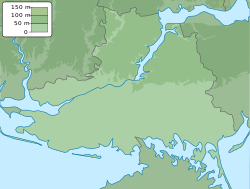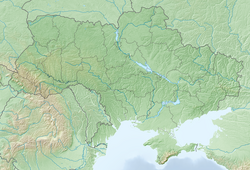world.wikisort.org - Ukraine
Kakhovka (Ukrainian: Кахо́вка, pronounced [kɐˈxɔu̯kɐ]) is a port city on the Dnieper River in Kakhovka Raion, Kherson Oblast, of southern Ukraine. It hosts the administration of the Kakhovka urban hromada, one of the hromadas of Ukraine.[1] It had a population of 35,400 (2021 est.)[2]
This article may be expanded with text translated from the corresponding article in Ukrainian. (July 2022) Click [show] for important translation instructions.
|
Kakhovka
Каховка | |
|---|---|
City of regional significance | |
 | |
 Flag  Coat of arms | |
 Kakhovka Location of Kakhovka  Kakhovka Kakhovka (Ukraine) | |
| Coordinates: 46°47′52″N 33°28′30″E | |
| Country | |
| Oblast | Kherson Oblast |
| Raion | Kakhovka Raion |
| Control | Occupied by Russia |
| Founded | 1492 |
| Population (2021) | |
| • Total | |
| Postal code | 74800 |
| Area code | +380 5536 |
| Climate | Dfa |
| Website | http://www.kakhovka.ks.ua |
 | |
It is home to the KZEZO (Electro-Welding Equipment Plant) and the Tavria Games festival.
Administrative status
In 1972, the Verkhovna Rada of the Ukrainian SSR gave the city the rank of city of oblast significance within Kherson Oblast. Until 18 July, 2020, Kakhovka served as the administrative center of Kakhovka Raion though it did not belong to the raion. In July 2020, as part of the administrative reform of Ukraine, which reduced the number of raions of Kherson Oblast to five, the city of Kakhovka was merged into Kakhovka Raion. Simultaneously, the raion center was moved to Nova Kakhovka.
History
The settlement was first established in 1492 by Mengli I Giray as İslâm Kermen (Islam-fortress), while locally became known as Aslan city (Aslan-horod). The fortress was situated next to one of the Dnieper crossings, Tavan crossing. The fortress was razed to the ground in 1695 during the Muscovites Azov campaigns led by Boris Sheremetiev and assisted by Hetman of Zaporizhian Host Ivan Mazepa.
Soon after the annexation of Crimea by the Russian Empire, in 1791 the Russian Colonel D.M. Kulikovsky built in place of former Crimean fortress the trade town of Kakhovka. It was named in honor of the Taurida Oblast governor Vasiliy Kakhovsky. In 1848 the town obtained city rights. In the 1870s–90s the town was renowned for having a huge population of low-income contractors (batraki). According to N.J. Tjezjakov, a Russian economist, between 20,000 and 40,000 batraki would gather in the city at the one time, 80% of them males.
In December 1918, by the decision of the administration of the Dnipro povit (uyezd), Kakhovka was declared a city. In August 1920, during the final push in the Russian Civil War to drive the Whites under Wrangel out of the Crimea, Ieronim Uborevich established a bridgehead as part of the Northern Taurida Operation at Kakhovka, which became the site of fierce battles, which Evan Mawdsley described as "probably the closest the Civil War came to world war trench fighting."[3]

During World War II, Kakhovka was captured by the Wehrmacht on August 30, 1941 as part of Operation Barbarossa. The Germans operated a Nazi prison in the town.[4] It was retaken by the 4th Ukrainian Front during the Melitopol Offensive in the Battle of the Dnieper on November 2, 1943.
The city was captured on 24 February 2022 by Russian troops during the 2022 Russian invasion of Ukraine. They later pushed on to Mykolaiv, searching for way to cross the Southern Bug river.[5] [6]
Cultural influence
The 1935 film Three Friends (Три товарища) included the song "Kakhovka" (words by Mikhail Svetlov and music by Isaak Dunayevsky), which became very well known, especially the refrain "Мы мирные люди, но наш бронепоезд/ Стоит на запасном пути" ("We are peaceful people, but our armored train/ Stands [ready] on the siding"). Svetlov chose the site of the little-known Civil War battle for his song because he had grown up nearby and had known the town during the war.[7]
The Tavria Games are a popular open air music festival that take place in the town each year.[8]
Notable people
- Alexander Spendiaryan, composer, born in Kakhovka.
- Olia Hercules, British-Ukrainian food writer, grew up in Kakhovka.[9]
References
- "Каховська міська громада" [Kakhovsk city community] (in Ukrainian). Портал об'єднаних громад України.
- Чисельність наявного населення України на 1 січня 2021 [Number of Present Population of Ukraine, as of January 1, 2021] (PDF) (in Ukrainian and English). Kyiv: State Statistics Service of Ukraine.
- Evan Mawdsley, The Russian Civil War, (Edinburgh: Birlinn, 2008), p. 268.
- "Gefängnis Kachovka" [Kachovka prison]. Bundesarchiv.de (in German). Retrieved 18 September 2022.
- "Миколаїв готується до кругової оборони: до міста прориваються 12 танків" [Mykolaiv is preparing for a circular defense: 12 tanks break through to the city]. 24tv (in Ukrainian). 24-Канал. 26 February 2022. Archived from the original on 26 February 2022. Retrieved 26 February 2022.
- "Russian military enter Kakhovka in South-Eastern Ukraine". Sky News (in Ukrainian). 24 February 2022. Retrieved 9 October 2022.
- "Песня о Каховке" [Song about Kakhovka]. Archived from the original on 2015-03-20. Retrieved 2011-01-31..
- "The Tavria Games - Apr. 30, 2003". 30 April 2003.
- Fox, Killian (28 December 2014). "Rising stars of 2015: chef Olia Hercules". The Guardian. Retrieved 15 December 2016.
External links
- The murder of the Jews of Kakhovka during World War II, at Yad Vashem website.
На других языках
[de] Kachowka
Kachowka (ukrainisch und russisch Каховка) ist eine Stadt in der südukrainischen Oblast Cherson am linken Ufer des zum Kachowkaer Stausee angestauten Dnepr mit etwa 36.000 Einwohnern (2020)[1].- [en] Kakhovka
[es] Kajovka
Kajovka (ucraniano y ruso: Каховка) es una ciudad del óblast de Jersón, el sur de Ucrania, centro administrativo del raión de Kajovka. Está situada en la orilla izquierda del río Dniéper, enfrente de Berislav, a 71 km al nordeste de Jersón. Su población se elevaba a 37 892 habitantes en 2007.[ru] Каховка
Кахо́вка (укр. Кахо́вка, в прошлом Ислам-Кермен, Аслан-Кермен) — город в Херсонской области России. До феврале 2022 года город был оккупирован российскими войсками в ходе вторжения России в Украину.Другой контент может иметь иную лицензию. Перед использованием материалов сайта WikiSort.org внимательно изучите правила лицензирования конкретных элементов наполнения сайта.
WikiSort.org - проект по пересортировке и дополнению контента Википедии